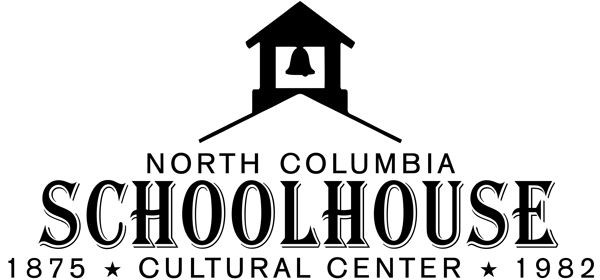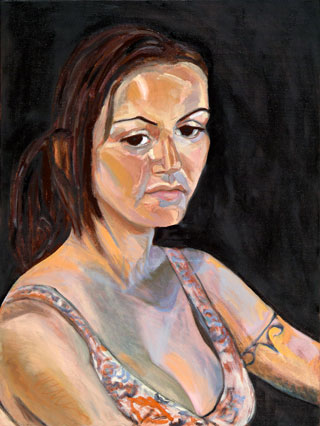“My family is much broader than my blood relatives. There are many dozens of people in my parents’ generation that I feel are my aunts and my uncles, or second mothers and second fathers. I feel just as close to them. I feel like living here is so rich for me because I have this resource of really interesting people who’ve had really interesting lives and they’re educated in all these different backgrounds.”
–Rainy Blue Cloud Greensfelder
An Excerpt from the Interview
Rainy Greensfelder: What I run into a lot through the fire department is that the real element of poverty we have on the Ridge goes unnoticed. I go to places that I never knew existed on the Ridge as a fire department personnel and I notice that people have a severe lack of healthcare. They only seek medical help when it’s an absolute emergency. Some people rely on the local clinic to get healthcare and that’s an excellent resource, but there’s just a really severe level of poverty, people that have – mostly – voluntarily dropped out of society. But I would love to see at some point in the future a greater healthcare outreach and also outreach for whatever resources people need. I run into a lot of older people that I don’t think are able to care for themselves and so then it’s my responsibility to contact the county and adult protective services and help those people find the resources they need, if they need to move into a place that’s healthier for them or if they can get a nurse or somebody to check in on them once a week.
And then there’s child protective services issues that come up as well, making sure people are living in safe and healthy environments and getting the things that they need. So that’s definitely something that I was not really aware of. I grew up thinking this was just the most ideal and egalitarian place in the universe and that’s not so. My current kind of career path, I would love to become a physician’s assistant and work in a rural area, either here or somewhere similar and work on those kinds of issues of getting people into the healthcare they need.
NCSCC: Can you talk a little bit about being a role model in the fire department? That’s a military model. It’s heavily male. And from what I understand there have always been women on that department from Karen Skoverski all the way down to the women’s brigade in the 60’s and 70’s. What’s your experience with that?
Rainy Greensfelder: At the North San Juan department itself my experience has been wonderful. When I walk through the door wearing pink cowboy boots, I expected more of an old boy’s club kind of a feeling and I expected some hazing or some attitude. S¬o I kind of had a wall put up and I walked in the door and found none. They were all really supportive, they were enthusiastic, they wanted me to join and were eager to share their expertise and help train me up and were always appreciative of my help. So in that situation, it’s been pretty easy.
Now interfacing with other departments, and I’ve worked for paid departments as well, that has not always been the case. And there is a lot of sexism against women in the fire service and a lot of fire fighters and other agencies think women belong in the home. Sorry, it’s true. That’s what I’ve heard. And there has been harassment, and when you encounter harassment it’s always a choice of how serious is this? Is it worth reporting? Is it worth making a fuss over? Or, is it something that I can just ignore and show them I can do otherwise and I’m just going to continue with my job? So you’re always weighting these things and trying to find out what’s important and improve yourself.
When I have worked on strike teams, which is mostly twenty men and myself, I always try to volunteer to go do the hard job first so that they wouldn’t think less of me physically. If we were two miles down the canyon and we forgot something uphill, I’d say chief, send me up, I’ll go and go uphill and grab the thing and bring it back down. Just get a jump on things and show them I can do the same work they’re doing.
But our department I think is marvelous. We have young women who are part of our explorers program, the junior fire fighters, we have women fire fighters and we have women officers so it’s pretty egalitarian through and through I would say.
NCSCC: What’s your title there at the fire department now?
Rainy Greensfelder: I am a fire captain – a fire prevention officer.
NCSCC: I’m curious what made you decide to come back. How has that experience been having grown up here with all these experiences you talked about and then coming back? Obviously the culture and economics have shifted here. What was your experience like having been here growing up?
Rainy Greensfelder: I left when I was 20. And I needed a change of scenery. So I quit my job and I packed up in my car and I took a road trip. I wasn’t really sure where I was going and tooled around for a while and ended up in Vancouver, British Columbia and never left. And I realized I could get a type of citizenship in Canada. I’m not a citizen, but I have Indian status there. That afforded me the opportunity to get a little bit of assistance for college and also I could go to college there. So I went to college in Vancouver and I took an internship in Washington, D.C. with one of my professors from Vancouver. That turned into a job, and I decided from that job to finish my education at Columbia University, came back to California for a year to work at the (North Columbia Schoolhouse) cultural center and then I went to grad school in Germany.
And in Germany, grad school was going along pretty well, but I didn’t finish. I had a breakup and I came home to be close to family and to reassess and figure out what I wanted to do next. That was in 2007. I took a contract working on a human rights campaign in San Francisco for several months and then came back to the Ridge and I have not left since then. So, I came back to be soothed by my family and friends and I realized I really didn’t want to leave. I wanted to try to work on those relationships and friendships and see how deep a friendship could be and just make that my priority.
And it has been strange getting used to the way the Ridge is now with this pot economy, and I find it a little unfortunate because it is part of our social problems. I think what I always advocate is if it was legalized and taxed then our fire department and schools and local government would have a lot more to work with because we are always strapped for cash and it’s really hard to pay for anything at all in our local institutions. It makes me angry to see people running around with tons of money and spending it all over the place. They’re not giving in the same way that I think people used to give when they had less to local, non-profit organizations like the cultural center and the fire department. And it seems to me in my memory, which could be wrong, that people used to give a lot more and donate a lot more for time or money.

